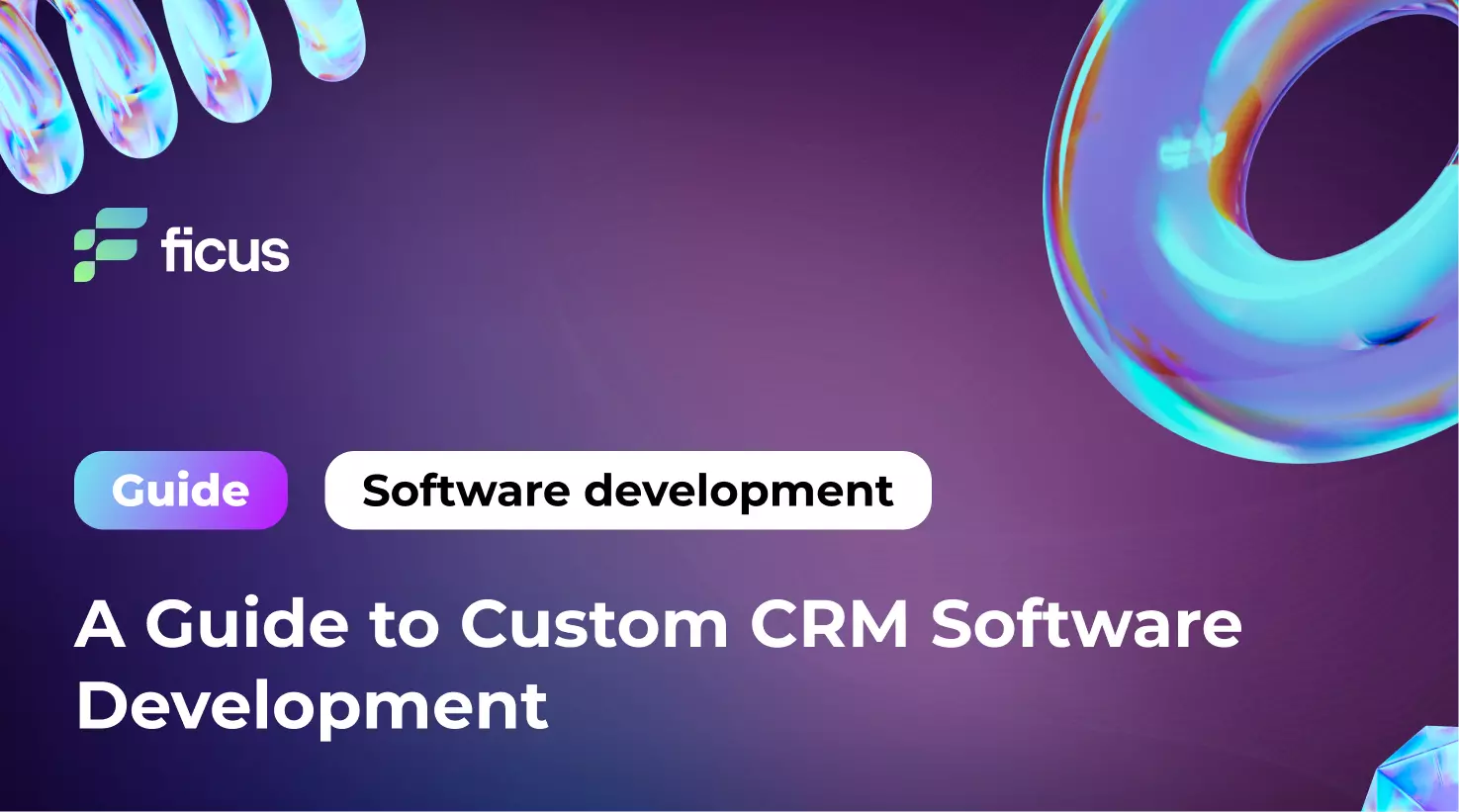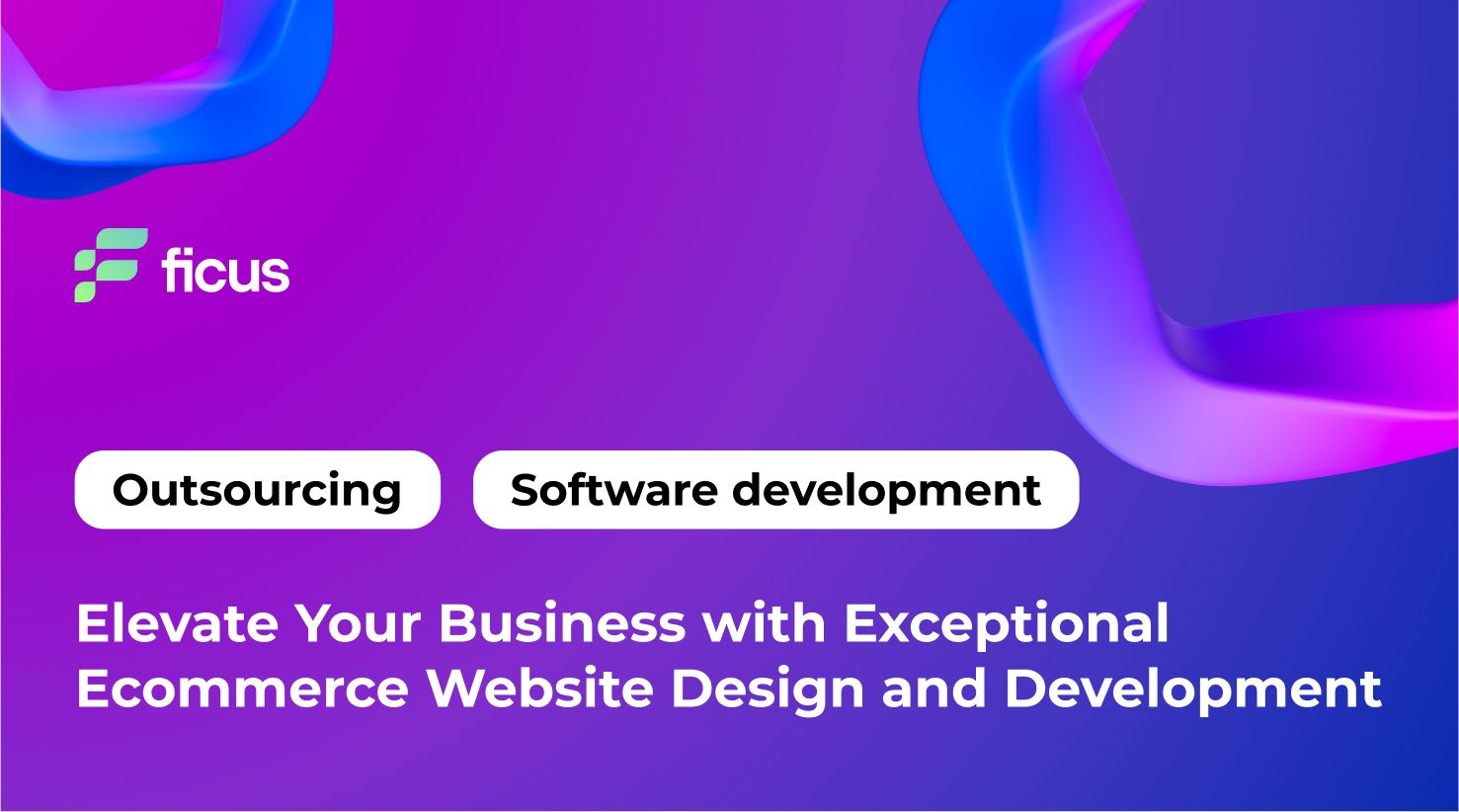The global CRM software market’s growth to $145.79 billion by 2029 underscores its transformative impact on customer service and sales. CRM systems excel at managing customer communications, sales analysis, account management, and automation, driving their widespread adoption. While many SaaS solutions are available, custom CRM software development excels at providing customized benefits.
- Custom CRM solutions improve customer relationship management.
- Tailored systems boost operational efficiency and sales management.
- Ficus Technologies enhances CRM strategies for business growth.
Why is custom CRM systems development necessary?
Custom CRM software development optimizes business processes by centralizing customer data and automating operations, directly increasing customer engagement and operational efficiency. Tailored to specific industry needs – such as real estate, e-commerce, etc. – it ensures that the relevant features are utilized to their full potential, overcoming the limitations of generic CRM systems. These customized solutions support mobile access and integrate different business functions into one platform, eliminating the inefficiencies of using multiple disparate systems and reducing unnecessary manual work.

Benefits of CRM software development
CRM software development is transforming the way businesses interact with their customers. It offers improved data organization, personalized communication, and in-depth lead analysis, creating the conditions for unmatched customer relationship management and operational efficiency.
Well-organized data
Implementing CRM software development services enables companies to manage consistent customer data, facilitating frequent updates of customer information and interactions. This implementation eliminates data discrepancies, making CRM an indispensable unified source for every department. Centralizing customer information streamlines processes, strengthens customer relationships, and accelerates business expansion. This simple solution solves customer data problems, significantly improving decision-making and operational efficiency across the organization.
Personalized communication
CRM software development revolutionizes customer relationship management by enabling personalized interactions through detailed customer data analysis. By understanding customer behavior, companies can tailor communications, increasing customer satisfaction and retention. Features such as customized email templates, integrated message reminders, AI chatbots, and automated follow-ups enrich the customer experience. In addition, integrating CRM systems with external software facilitates unique, efficient workflows by creating a holistic ecosystem that centralizes all customer interactions and updates, effectively optimizing communication strategies.
Lead engagement analysis
Partnering with an experienced CRM software development company enhances your lead management by expanding your ability to select and evaluate leads effectively. Such a CRM system helps you to identify and prioritize leads. It supports advanced data collection and reporting workflows, allowing business owners to access information and conduct in-depth analyses of their sales prospects. This feature simplifies the evaluation process and ensures that growth opportunities are never overlooked by optimizing lead acquisition strategies.
CRM is your GPS to a better route on your Business Development journey
Bobby Darnell
Types of CRM software
Distinguishing between CRM development software types companies to effectively adapt their strategies, providing more accurate customer relationship management, optimizing operational workflows, and maximizing sales opportunities.
Operational CRM
Operational CRM development software revolutionizes how companies handle sales, marketing, and customer service tasks. By automating routine operations, companies save time and improve decision-making by understanding customer preferences and behavior. These systems directly increase customer satisfaction and profitability, contributing to smoother and more efficient workflows. They are especially useful for companies looking to streamline daily tasks and ensure cohesion between sales, marketing, and service departments by fostering an environment of information sharing and collaboration.
Strategic CRM
Strategic CRM uses CRM development software to analyze and apply customer interaction data, helping to strengthen relationships. Its importance lies in its ability to help companies make informed decisions about customer interaction tactics. Focusing on data-driven strategies ensures companies can adapt their communications and offerings to customers’ changing needs, leading to increased loyalty and a solid foundation for sustainable business growth. With strategic CRM, companies adapt quickly to market changes and customer preferences.
Analytical CRM
Analytical CRM, complemented by CRM software development services, turns customer data into actionable insights that allow companies to fine-tune their customer service, marketing, and sales strategies. It leverages customer behavior patterns and preferences, providing a foundation for data-driven decision-making that increases customer engagement and loyalty. Companies can directly influence customer satisfaction and growth by predicting their needs and adapting their interactions accordingly. Thus, analytical CRM serves as a tool for using detailed analytics to improve and personalize the customer experience, contributing to achieving strategic business results.
Collaborative CRM
Collaborative CRM system bridges the communication gap between departments such as sales, marketing, and customer service, promoting a unified approach to customer interaction. By integrating CRM development software, each team has immediate access to shared customer information, optimizing interaction across all channels. This connection allows you to create a cohesive narrative in customer relations, reducing duplication and improving the overall customer experience. It is designed to efficiently manage communications, content, and workflows, ensuring that every customer interaction is informed and aligned, leading to increased satisfaction and loyalty.
Ready to transform your CRM software?
Contact UsWhat business problems does custom CRM software development solve?
Custom CRM software development goes beyond basic automation to offer solutions tailored to unique business challenges. It streamlines operations, improves customer experience, and provides detailed analytics, leading to more informed decision-making and strategic growth opportunities.
Loss of new clients
CRM development software significantly reduces the loss of new customers by eliminating common service errors, such as when managers forget to call back on time. It eliminates the oversight of customer progress through the sales funnel, often leading to the loss of deals. CRM automates tasking for managers – calling back, sending emails, receiving responses, writing messages – ensuring that they know exactly who to contact today and who can wait until next week, thus streamlining customer management and improving service delivery.
Unclear indicators of managers’ work
CRM development software solves the problem of monitoring managers’ performance by providing clear indicators of customer interaction, adherence to sales scenarios, and overall progress through the sales funnel. It offers intuitive interfaces for evaluating performance through calls, customer progression, and sales achievements. This level of insight ensures that every customer interaction is optimized for maximum efficiency and effectiveness, directly impacting a company’s ability to increase sales and improve customer satisfaction by optimizing communication channels and process settings.
Requests from different sources get lost
Custom CRM software development transforms customer relationship management by centralizing communications from multiple sources, such as phone calls, emails, website inquiries, and social media comments. This consolidation prevents requests from being missed and allows managers to respond to all inquiries through a single platform. With access to a single interaction history, specialists can recall previous discussions, ensuring continuity and personalization of customer service. This efficiency increases customer satisfaction and optimizes workflow and productivity.
Leads are not converted into sales
When leads don’t move to the sales stage, CRM software development services offer a transformative solution utilizing targeted marketing techniques. These services allow companies to display ads with precise messages tailored to the current phase of the customer experience, which helps to increase engagement and increases the likelihood of converting leads into actual sales. By identifying and responding to each lead’s unique needs and interests, companies can more efficiently guide them through the sales funnel, increasing conversion rates and revenue.
Routine is time-consuming
Routine tasks consume precious time, but custom CRM software development offers a powerful tool that automates them and increases management efficiency. After receiving a customer inquiry, emails and SMS greetings are automatically sent, and targeted social media advertising further engages the customer. When a customer is close to purchasing, generating invoices and contracts becomes a one-click operation, with all the necessary data directly filled in. This automation streamlines sales and customer interaction and closely tracks management activities and vital business operations.
Top 3 CRM software development trends
The study of the three main trends in CRM software development shows how companies use innovative technologies to improve customer relationships, optimize operations, and secure competitive advantages in a constantly evolving market.
1. AI-powered
AI-based CRM software development services significantly improve business operations:
- Automates customer support, simplifying the processing of requests.
- Initiates email notifications to maintain customer engagement.
- Analyzes customer behavior, effectively adapting marketing strategies.
- Predicts trends, preparing the business for future requirements.
This technology optimizes interaction and provides a personalized customer experience, contributing to revenue growth. Companies that use AI in CRM platforms gain a competitive advantage by more effectively predicting and meeting customer needs.
2. Voice technology
Integrating voice technology into CRM software development services is revolutionizing customer experience:
- Using voice assistants for efficient service delivery.
- Introduces voice biometrics, increasing security and personalization.
- Automates call centers, reducing wait times and increasing customer satisfaction.
- Uses speech analytics to understand customer needs better.
This innovation enables natural communication, transforming how companies provide support and services. By implementing voice CRM systems, companies can offer a more personalized, secure, and efficient customer experience and set new standards for customer engagement.
3. Integration with IoT
CRM software development services now encompass IoT integration, transforming CRM processes with data from IoT devices. This integration
- Provides a deep understanding of customer behavior.
- Supports the development of adaptive marketing strategies.
- Improves sales and customer service by offering accurate, personalized experiences.
- Allows businesses to conduct predictive analytics and service effectively.
- Facilitates proactive service delivery.
By using data from IoT devices, companies can tailor their offerings to customers’ needs, ensuring a more engaged and satisfied customer base.
The main things to consider before building a CRM system
Building CRM development software is a complex process that requires careful attention to several critical factors to ensure its success. Each step is crucial, from forming a diverse project team that includes business analysts, designers, and developers to completing the requirements analysis and deployment. Understanding these considerations not only simplifies the development process but also increases the effectiveness of the final product by tailoring it to your business needs.
1. User interface
The user interface in CRM software development services transforms complex CRM functionality into accessible tools for daily use. Simplicity is the linchpin that ensures employees can intuitively navigate the system without sifting through complex instructions. Aim for interface simplicity, like a well-told joke, favoring clarity and ease over many features. This approach simplifies the adaptation process and increases the level of automation of business operations, making CRM an integral part of the workflow.
2. Integration with internal business software
Ensuring that custom CRM software development integrates with existing business software eliminates duplication and optimizes workflows. This integration allows for efficient data exchange between platforms, reducing the need for manual data entry and increasing accuracy. This unification facilitates better decision-making by providing a comprehensive view of business operations. It simplifies maintenance management, increasing operational efficiency and reducing the complexity of managing multiple systems, resulting in a more streamlined and efficient business.
3. The use of the cloud
Implementing custom CRM software development for cloud integration gives companies a strategic advantage. By utilizing the cloud, companies can significantly reduce operating costs. This flexibility also means they have enough space to store large amounts of data, increasing operational efficiency. In addition, cloud solutions provide scalability, allowing companies to customize resources to meet changing needs. Improved accessibility ensures team members can access important data anywhere, increasing collaboration and productivity. Thus, creating a cloud-based CRM system optimizes data management and promotes business growth.
4. Post-project maintenance
Even with rigorous testing and problem fixes, delivering a sophisticated, scalable custom CRM software development solution is never without its challenges. Therefore, choosing a CRM development company that offers comprehensive post-project support is very important. Such support ensures that any issues that arise after the product goes live are quickly resolved, providing peace of mind and immediate assistance with any operational issues, effectively protecting CRM functionality and your investment in the technology.
5. Custom CRM development company
Working with a reputable CRM software development service provider increases the effectiveness of custom CRM. Such a company goes beyond technical development by offering competitor analysis, developing software requirements documents, and recommending functionalities that tailor CRM to specific business needs. This partnership guarantees a reliable solution that meets strategic goals and increases operational efficiency and competitive advantage. A thorough evaluation of a vendor’s portfolio and expertise in their respective industries is crucial, ensuring they meet your project ambitions and contribute to a comprehensive, customized CRM solution.
How do you choose the best CRM software development company?
Exploring the latest trends in customer relationship management software development provides insight into how technology is impacting customer relationship management. From artificial intelligence to blockchain, these advancements are making CRM software development services more efficient, secure, and personalized, giving companies the tools they need to increase customer engagement and drive growth.
Solid technology expertise
A successful CRM software development partnership depends on choosing a company with strong technological skills. Look for experience with cloud platforms such as Microsoft Azure, AWS, and GCP; DevOps and CI/CD methodologies; low-code and no-code development capabilities; and big data, data science, analytics, and business intelligence expertise. In addition, experience with artificial intelligence, machine learning, and major digital platforms such as SAP, Salesforce, and OpenText indicates that the partner is ready to deliver advanced CRM solutions.
Agile approach to development
Partnering with a CRM software development services business that embraces an Agile methodology transforms the advancement process into convenient models.
Each phase yields a functional incremental product, fostering an environment in which user feedback is quickly integrated, ensuring that the final CRM system closely matches the ever-changing needs of the business. The iterative nature of Agile promotes flexibility, making it easier to adapt to changes and incorporate new ideas, resulting in a more advanced and effective CRM solution.
Information security and compliance
Protecting sensitive data distinguishes a reputable custom CRM software development company. Compliance with global security standards, including ISO 27001:2013, ISO 9001:2015, HIPAA, PCI DSS, and GDPR, is non-negotiable. The GDPR’s emphasis on lawfulness, purpose limitation, minimization of storage, and confidentiality guarantees protection against potential threats to customers’ personal information. Your partner’s compliance with these standards ensures your CRM system is secure, respects customer privacy, and complies with legal requirements.
Experience with enterprise software development
A company’s experience with custom CRM software development for large enterprises directly affects its ability to tailor solutions to the business’s unique needs. A developer’s demonstrated success in adapting CRM systems to specific operational workflows means that they can navigate the complex requirements of enterprises. This experience demonstrates the developer’s ability to modify existing platforms and innovate to solve unique challenges, ensuring that your CRM solution integrates seamlessly into operations, increasing efficiency and improving customer relationships.
Final Thoughts
Delving deeper into custom CRM software development opens opportunities to improve customer relationships and optimize operational efficiency. Customized solutions meet unique business challenges and requirements, providing a more personalized approach to customer service and sales management. These customized systems integrate seamlessly with existing workflows, providing a centralized platform for data analytics, marketing automation, and customer engagement that promotes a deeper understanding of customer needs and behavior.
Ficus Technologies specializes in creating customized solutions, focusing on each client’s unique needs and perfectly aligning them with their business processes. Our experience allows us to create systems that improve the customer experience and optimize internal workflows, ultimately driving growth and efficiency. With Ficus Technologies, you get a partner dedicated to innovative customer relationship strategies, turning challenges into opportunities for success.
The development time for CRM software can vary greatly depending on its complexity, required functions, and whether it is created from scratch or adapted from existing solutions. For a basic CRM with basic functions such as contact management, task management, and simple reporting, development can take 3 to 6 months. However, for a more complex, custom CRM system with advanced features such as sales forecasting, custom integrations, or artificial intelligence capabilities, the development process can take up to 12 months or more. The timeline is also influenced by the size of the development team, their experience, and the project’s iterative feedback and testing stages.
The choice of language for CRM development largely depends on the specific requirements and infrastructure of the project. The most common languages include
JavaScript is for dynamic front-end development and improving user experience.
Python is valued for its simplicity and efficiency. It is often used for data analysis, machine learning functions, and backend development.
PHP is a server-side scripting language for web development and dynamic page content creation.
Java is known for its portability across platforms and is used in corporate environments due to its reliability.
.NET (C#) is used for its scalability and reliability in enterprise applications and is suitable for web and server-side development.
These languages were selected based on their ability to meet the CRM system’s functional and operational needs, among other things.








